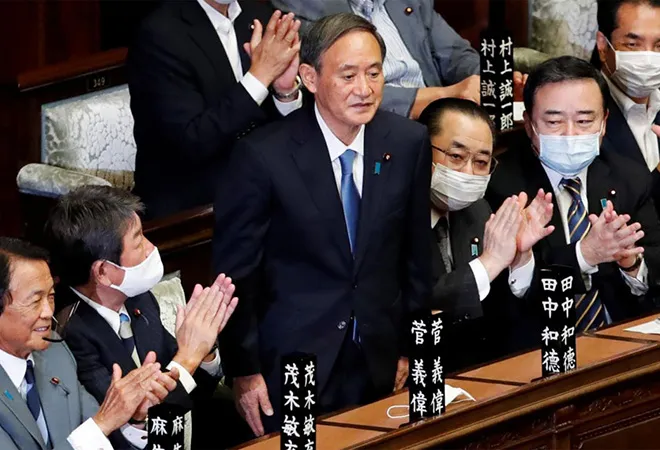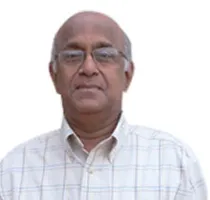-
CENTRES
Progammes & Centres
Location

The Liberal Democratic Party’s (LDP) Presidential election is over and as expected, Suga Yoshihide has been elected as the party boss, replacing Shinzo Abe, the outgoing party president and the prime minister. Suga, a dark horse until the last moment, has now emerged as the central figure in Japanese politics. Technically, he has been elected for only one year covering the remaining period of Abe’s tenure until September 2021. This has made some commentators describe him as a stop-gap party president. But the overwhelming support from five major mainstream factions that was demonstrated at the election indicates that Suga, unless there is a sudden shift in the present factional configuration, may stay beyond September 2021.
It is important to note that Suga at 71 is senior to the other two presidential contenders, Shigeru Ishiba (63) and Fumio Kishida (63) who are perhaps better known because of the important ministerial positions that they held in the past. For instance, Ishiba, a former defence minister, has been well known for his views on Japan’s defence policy, China, Japan-US security alliance and North Korea. He had contested unsuccessfully against Abe in 2012 and 2018 for party presidency. In the 2012 Presidential election, he had polled more popular votes than even Abe. As for Kishida, he was foreign minister for five-years under Abe before he was inducted into the management of party affairs as the policy chief. It is well-known that Abe had initially encouraged Kishida to take over from him the reins of government, but later, he suddenly changed his mind to prefer Suga.
One reason for Abe’s change of choice was Suga’s loyalty to him for a long time. Suga does not have a faction of his own within the party. He is not a charismatic leader; nor does he claim a rich family pedigree. He has not developed his own grand vision on how the LDP should develop in the future in the midst of the rapidly changing economic, societal and strategic demands of the country. During the first stint of Abe’s prime ministership (2006-7), he served as a cabinet minister in charge of internal affairs. When Abe was on the political side-lines during 2008-2012, Suga stood by him rather steadfastly. Following LDP’s landslide electoral victory in 2012, which catapulted Abe to the prime ministership for the second time, he picked up Suga as his Chief Cabinet Secretary (CCS) -- a post considered second only to prime ministership in importance. Suga remained in that post for more than seven and a half years and created history as the longest serving chief cabinet secretary in the post-War Japanese politics.
As CCS, he coordinated policies with different ministries and acquired rare insights into the working of the administration This inevitably brought him face to face with handling the powerful Japanese bureaucracy. Yet, the popular image of Suga is that he has chosen to be a behind the scene player rather than a frontline initiator. This aspect of Suga was more than amply demonstrated when he loyally carried out Abe’s policies during his stint as the CCS.
Commitment to Abe’s policies would be the hallmark of the new administration under Suga. His cabinet has already been dubbed by many analysts as a “continuity cabinet”. He has retained eight ministers of the outgoing Abe cabinet in the same portfolios and given new portfolios to seven ministers. He has inducted only five new faces including Kishi Nobuo, Abe’s younger brother as defence minister. Some of the heavyweights, including Aso Toru, Motegi Toshimitsu, Kono Taro and Kato Katsunobu will provide stability and continuity needed for the smooth functioning of the cabinet.
In his very first statement after his election, Suga emphasised that his cabinet would essentially be known for continuing the policies of Abe, and as such, it would pursue a two-pronged strategy to revamp the badly damaged economy while sparing no efforts to go all out to control the coronavirus. Suga pledged to implement Abe’s policies, including Abenomics which is a combination of measures fighting deflation and accelerating economic growth. He hinted at undertaking a set of new measures to reinvigorate the economic package announced earlier by the Abe government to tackle the sagging economy and promote tourism. As for boosting national revenue, he is painfully aware that the government will have to increase at some point the consumption tax beyond the present 10% over the next ten years or so.
As Suga has himself admitted, it is going to be a formidable challenge to contain the coronavirus while simultaneously seeking to boost the economy. This is not to ignore that Japan has handled the COVID-19 crisis fairly well as has been evidenced in the relatively lesser number of infection cases, smaller number of deaths and the high rate of recovery. But what is worrisome is that there has been a deterioration in the situation since July, particularly in urban areas like Tokyo where the viral cases have surged on a big scale due to relaxation of restrictions
In the sphere of Japan’s foreign relations, Suga has stated that he will continue Japan’s traditional emphasis on keeping the security alliance with the US as the cornerstone of its policy. He will, of course, wait till the US Presidential election in November and depending on its outcome, he would make necessary adjustments in Japan’s relations with the US. Like Abe, he would like to see that Japan’s relations with China become stable without offending Washington and without compromising its position on territorial sovereignty and maritime security. Considering the worsening security situation in the Indo-Pacific, he will continue to support Abe’s ‘Free and Open Indo-Pacific’ strategy and strengthen partnerships with India, Australia and the ASEAN.
Finally, Abe, despite his continuous efforts, failed in his mission to get the Japanese Constitution amended and left it to his successors to pursue it. Suga has not stated anything on the subject. But some analysts believe that he may not show the same zeal as Abe in pushing the subject right at the beginning. He may wait until after the Lower House election whenever it happens.
But the question that concerns the Japanese people most is: When will Suga dissolve the present House of Representatives and call for fresh election? The present House has its tenure until September 2021, but Suga has the prerogative to choose the timing for dissolving the House and that would depend on long consultations with party officials and faction leaders.
The views expressed above belong to the author(s). ORF research and analyses now available on Telegram! Click here to access our curated content — blogs, longforms and interviews.

K.V. Kesavan (1938 2021) was Visiting Distinguished Fellow at ORF. He was one of the leading Indian scholars in the field of Japanese studies. Professor ...
Read More +